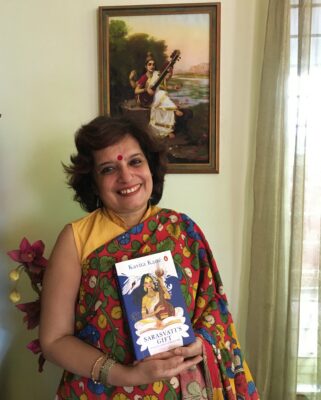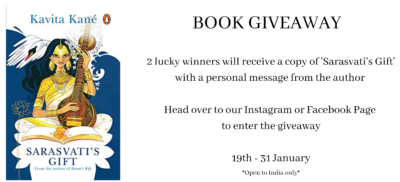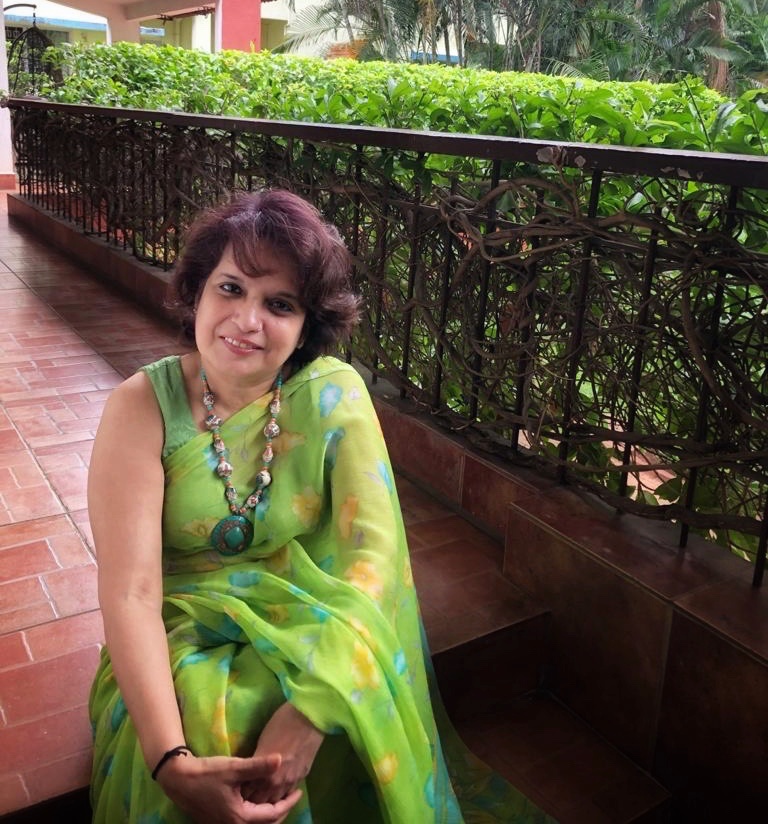
To my mind, best-selling author Kavita Kane’s new novel, Sarasvati’s Gift is her most feminist one yet. Known for writing about female characters who don’t take centre stage in Indian mythology, in her latest book author Kavita Kane has found her muse in the Hindu Goddess of knowledge, art and music, Saraswati.
We sat with the author to talk about her book Sarasvati’s Gift, what it takes to write about a Goddess and much more.
From writing about lesser-known mythological women, what lead you to write about a Goddess and why Saraswati?
I had long decided that if I ever were to write about a God or Goddess, it would be Saraswati. We revere her, worship her as the Goddess of Knowledge, yet we know nothing of her or what she means and symbolises.
Sarasvati’s Gift refracts the untold story of Saraswati, a glimpse of a remarkable woman and her story obscured and buried beneath the myth, legends and plain ignorance.
Although she is married to Brahma, the creator, she is that Goddess whom we see as a singular and independent deity. And therein lies the difference between them and Shiv-Parvati and Lakshmi-Narayan. Born as the Muse of Brahma, his inspiration, vision, essence, and creativity in creation, Saraswati is more than his consort: she is a goddess yet an iconoclast, a non-conformist.
As the river goddess, she streamed like free flow of thought and wisdom, and on her shores nourished an ancient civilisation, where people lived, and literature and the arts prospered. As a goddess, and the revered river, and most importantly, as a vast flow of tradition, embracing all streams of thought – this fiercely fair and fearless Goddess is ever ready to retaliate for justice and true knowledge. She remains an enigma, symbolising holistic wisdom, which can create and recreate people and a nation.
She stands unique: the intrepid, free soul she essentially is; she is clever, articulate and argumentative, recurrently confronting the authority of the male trinity of Brahma, Vishnu and Shiva. Averse to marriage and motherhood, she consciously discounted both, and while eventually conceding to marry Brahma, she refused to bear children. She reminds the Gods and the mortals that she is a woman first, not a wife, not a mother: and yet she is worshipped as the Mother Goddess, the supreme Goddess of learning.
The book is not just about this exceptional Goddess but rather about us- humans and humanity – and how we have used or misused and abused the one gift she gave us- knowledge and wisdom. She disappeared to become a ‘lost river’, but god forbid, what if she becomes a lost Goddess who abandons us, and we are lost to her? What a terrible barbaric world that would be.
How was writing about a Goddess different from writing about mythological characters? Was there ever a time that you felt daunted or overwhelmed, considering Saraswati is loved and revered in millions of homes?
Definitely difficult! But again, I have tried to show her as more than a Goddess of worship. She’s an abstract notion, almost a philosophy of thought which we need to understand to survive in a better, kinder, intelligent world.
Yes, considering the enormity of her status and the situation, I tried to demystify her and deconstructed her into a notion, a belief we need to understand.
I particularly enjoyed how you humanised the Gods and Goddesses and made them relatable. Do you think presenting them in this manner changes the way people perceive the Gods?
That’s what our epics and ancient texts are about- not stories of Gods and Goddesses but about humans and humanity, about mortality and the flaws and faults of Man, and the underlying issues of these mortal fallacies. It’s not about divinity or divine interventions but human efforts, errors, and the will to fight our battles.
Your books don’t touch upon religion despite revolving around mythology. Is this a deliberate decision?
I believe human relationships go beyond societal rules and religion, creating a bond known as kinship that has a certain humanitarian hold over us. Because we need to think beyond personal religion. Or rather comprehend the philosophy and the thought rather than blindly follow as religion often makes you do.
What is the importance of highlighting the element of feminism in mythology?
Feminism is not about reverse sexism. It is about seeing the woman as a person, as you would see a man having equal rights, opportunities and choices. Should we not see a woman as an individual rather than just the role she is supposed to play – that of a daughter, wife, mother that society and family have slotted her into? She has been reduced to a stereotype, an oversimplified embodiment limiting her in a convenient, conventional image. Free will and free choice are her natural rights as they are for a man.
Similarly, we rarely see our epics through a woman’s eyes. Because they are stories written by men, told by men and distorted by men. There are so many remarkable women populating the classical texts but honestly, what is ‘their’ individual story? Besides female protagonists like Sita and Draupadi, can you imagine the epics without Kunti, Gandhari or Satyavati? Or the Ramayana without Mandodari , Tara or Urmila? They are all iconic women, possibly even role models for us.
“Women need to write about women”, something you said in a recent interview. Is this one of the driving forces behind the stories you write?
Always. It’s about a woman and women, womanhood and sisterhood, the kinship that binds them together to make a family, a community and a larger world. She may be a woman of power and prestige, a woman of purpose, a woman disadvantaged and discriminated: they are all our stories that have to be told. And retold. As a fair, conscientious society, we must see, acknowledge and respect the ‘women’ in our lives, society, and world. Women are the other half of our population, the other half of the species. Yet, even now, they are being marginalised at every level in society, fighting double hard to survive and sustain themselves in a largely male-dominated world.
Has writing and researching these women-centric stories changed you in any way through the years?
Hopefully, they have made me more empathetic! These are not ancient characters from ancient stories; they exist even now with us. It’s just that we don’t recognise that we still have Urmilas, Ahalyas, Surpanakhas, Satyavatis and Sitas in today’s times too. Look around, and you might see them.
Being a feminist and a mother of two daughters, what is some advice you give them about being women in today’s world?
That to have a high level of self-respect, to like, love and respect yourself and secondly, to never give up on your convictions.
Two characters you have written about whom you would love to have over for a cup of coffee and why?
Satyavati and Saraswati. Simply because I would love to chat and know more about these two supremely fascinating women of how they, in their own drastically different yet individual way, carved a place for themselves in the world they lived.
A message for your very dedicated fanbase for the new year.
Look forward, move forward.


Share
Picture Credit : Kavita Kane

Dear Shikha, what an absolute delight to read your article, loved your conversation with her. Kavita Kane is one of my favourite authors too as I have often shared with you, I love her insights into the woman’s story and part in history. Haven’t read her latest, need to catch up on it.
Thank you for a brilliant read once again
Absolutely amazing interview! Kavita Kane ma’am is certainly one of the most significant and powerful authors of the modern India. This interview brings out so much insight into her noble ideologies – brilliant in every sense.
Lovely read shikha! Always enjoy your articles was great to learn about our goddesses from kavita Kane very enjoyable read!
I really enjoyed reading this interview with Kavita Kane as I have not read her work before but she sound really great! Her stories seem really interesting too so thank you for sharing!
Molly | transatlanticnotes.com